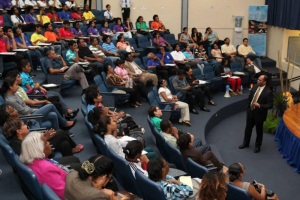Outreach is an important part of the UH Cullen College of Engineering’s mission, and many professors, staff members and students work in and around the Houston area promoting STEM education, involvement and research.
Ravi Birla, associate professor of biomedical engineering, took it one step further. This summer, he took his outreach efforts on the road and travelled to Trinidad to speak to over 200 local students about engineering and the importance of STEM education.
Birla spoke at a conference sponsored by the National Institute of Higher Education, Research, Science and Technology (NIHERST), a government organization in the Republic of Trinidad and Tobago responsible for promoting the development of science, technology and higher education in the country and enhancing the innovative, creative and entrepreneurial capabilities of the general population. The seminar was the 13th annual Caribbean Youth Science Forum (CYSF), a conference widely viewed as a unique and vital platform for nurturing the Caribbean’s future scientists.
For Birla, the mission hit close to home. He is a proud born-and-raised Trinidadian, and he didn’t come to the United States until he made the decision to pursue a doctoral degree abroad – a common theme, he said, for the nation’s advanced degree seekers.
“Most people who want to do Ph.D.’s and so forth, they go abroad,” Birla said of the Trinidadian population. “[The government] wants to change that. They want their brain power to stay there. It makes no sense to have your talented people go abroad and make a name for themselves somewhere else.”
Birla said one of the missions of the CYSF is to encourage young Trinidadians to explore degree options at home. “The question is, what can we do to have them stay [in Trinidad]? So the government is actually investing really heavily in research infrastructure, building new labs, promoting these events. They recognize it’s important and they want to do something,” he said.
For his talk and workshop, Birla said that while his own research came up, it wasn’t the main focus. “It wasn’t about my research. It’s more about talking to the students and promoting science… My research was just sort of a mechanism to talk to them.” he said. After he delivered his public lecture, he sponsored a 2-hour workshop for the students to get hands-on experience with basic engineering principles using materials like Legos. “It gives me an opportunity to talk to them one-on-one, and it gives them something to do that’s hands-on,” he said.
Birla was one of over 30 speakers, and he said the goal was to expose the students to as many fields as possible in the week. “If you talk to these students, they’re very bright, motivated, enthusiastic students,” he said. “They’re sort of in a state of flux over what to do next… A lot of them come kind of knowing what they want to do, but a lot of them come open minded, so the fact that so many of us are talking to them at the same time gives them so many different opportunities and things they can see. We just hope something connects with them.”
